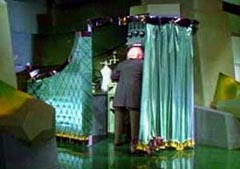How easily are people manipulated? How quickly can someone change a complete stranger’s will? Just how fragile are we, mentally speaking? A few videos from skeptic Derren Brown shows just how easily someone with skills can manipulate people.
- Cold Reading/Predictability
- Instant Conversion Part I
- Instant Conversion Part II
- Russian Scam
- How mediums work
- Voodoo
But by far, the best (a tie):



 It lacked mystery.
It lacked mystery.